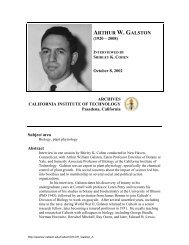Interview with Thomas A. Tombrello - Caltech Oral Histories
Interview with Thomas A. Tombrello - Caltech Oral Histories
Interview with Thomas A. Tombrello - Caltech Oral Histories
Create successful ePaper yourself
Turn your PDF publications into a flip-book with our unique Google optimized e-Paper software.
<strong>Tombrello</strong>–106<br />
TOMBRELLO: They really put almost no money in it. They had to give them space, but they<br />
charged them for it; they didn’t like it. The women here who were in the previous generation<br />
didn’t understand the point of it, because they didn’t work and they didn’t understand the whole<br />
model. My first wife, Ann, was a relatively young wife of a senior professor, and so she was<br />
caught right in the middle. She had gone back to school. Now her kids were old enough that she<br />
didn’t need that kind of child care, but she understood what this new group of women were<br />
about, and why they didn’t want afternoon meetings of the <strong>Caltech</strong> Women’s Club—because<br />
they were working. It was an interesting transition. Stephanie was one of the activists. I didn’t<br />
know her until later. But Ann was allied <strong>with</strong> that side in a way, trying to translate what they<br />
were saying to the women that she had been associating <strong>with</strong> and who just didn’t understand why<br />
these women were being so difficult about something that they hadn’t needed at all. The answer<br />
is, Well, they need it now.<br />
ASPATURIAN: Was there anything particular about your two years at Schlumberger that you<br />
brought back to <strong>Caltech</strong> that affected or reinforced your outlook or shaped your thinking or<br />
behavior?<br />
TOMBRELLO: Well, it convinced me that I really could run something. Of course, I had been<br />
running Kellogg for a while—roughly nine, ten years—so I knew I could run something. But<br />
this was more freestanding. This was something where I was the one who sent the Christmas<br />
presents to the local police department and the fire department and, you know, dealt <strong>with</strong> the<br />
local taxes and the rest of it. That’s a confidence builder. You can take a complex situation,<br />
break it down into pieces, and make it work. You also have more scope than I had at <strong>Caltech</strong>—<br />
though I did run Kellogg and that was not a small operation. There may have been, at the high<br />
point, ninety people associated <strong>with</strong> Kellogg—students, faculty, and technicians and engineers.<br />
Budget of several million dollars. Now, it was a much smaller budget than at Schlumberger, but<br />
a lot of them were students, and therefore they weren’t paid very well.<br />
Yes, I think it was confidence building—the feeling that you’ll make mistakes and you<br />
have to figure out ways to correct the mistakes. Of course, you always try to avoid making<br />
mistakes, but you can never avoid making them. You often have to make decisions based on<br />
limited data. You also learn to evaluate personality types that can either help you or that will<br />
http://resolver.caltech.edu/<strong>Caltech</strong>OH:OH_<strong>Tombrello</strong>_T

















